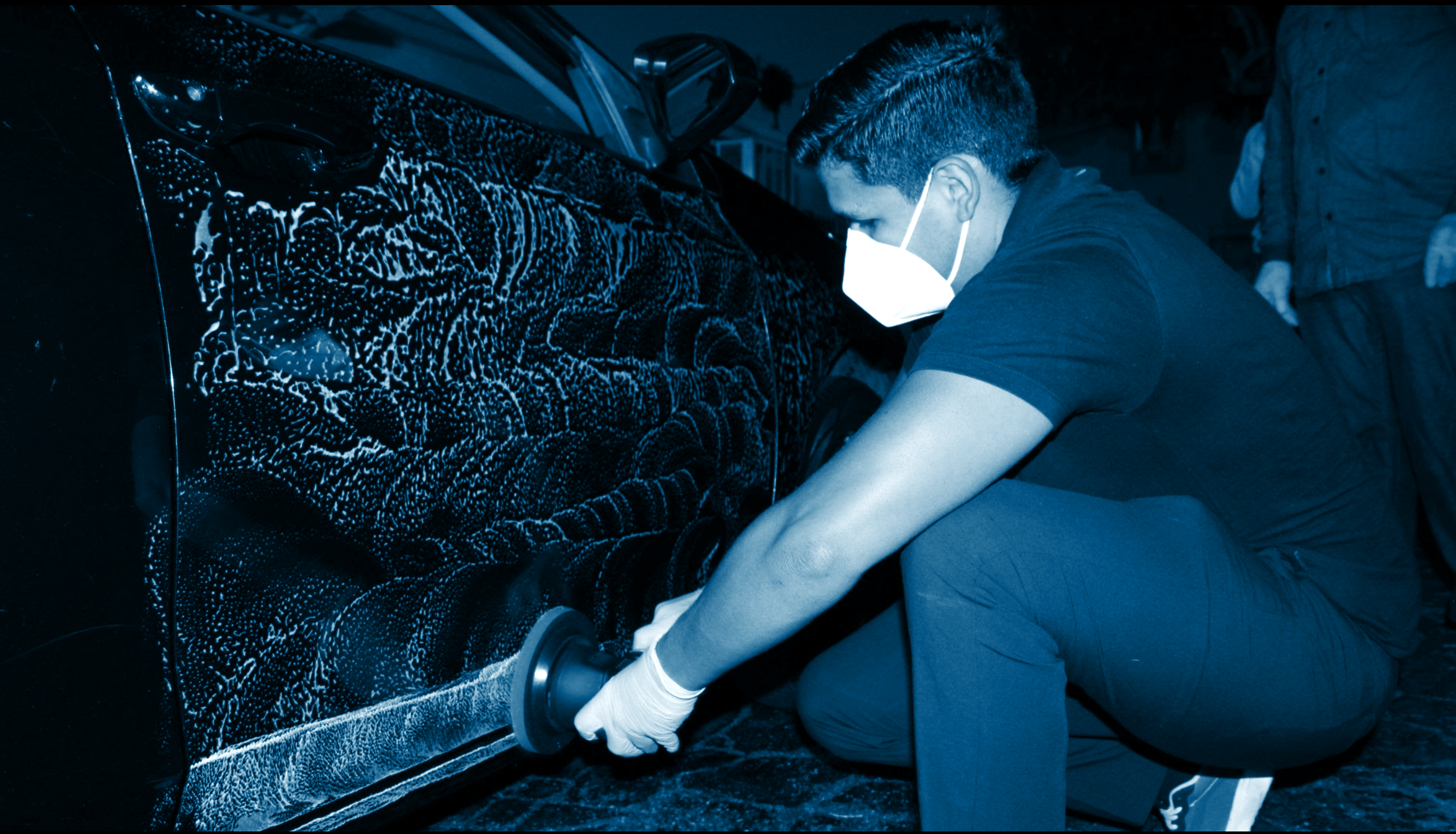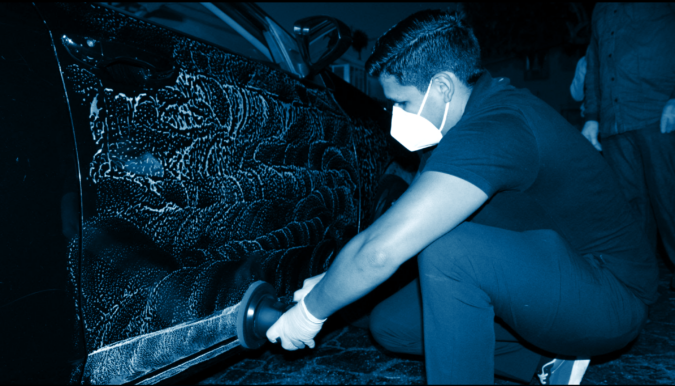Occupational health intern reflects on his experience training workers at local car wash establishments
Occupational health intern reflects on his experience training workers at local car wash establishments
Alejandro Muñoz joined AOEC’s OHIP internship this summer and will go on to pursue master’s degree focused on industrial hygiene
This story is part of our IRLE Engaged Learning Series. This series highlights the experiences of students connected to IRLE and their contributions within both our own units and local community organizations.
By Lesly Ayala | September 9, 2021
Alejandro Muñoz’s interest in occupational health and safety is not only a professional interest but also a field of study that is very personal to him.
Growing up in an immigrant family in Wilmington, a city that is about 25 miles south of UCLA, Muñoz saw the effects of pollution and unfair work practices through the experiences his parents were subjected to at work. Their struggles motivated him to pursue the field of occupational health to improve the work conditions of other workers like his parents.
To get some hands-on experience, Muñoz participated in the Occupational Health Internship Program (OHIP) this summer.
“Throughout the internship, Alex always took initiative and was always willing to learn and try new things. He was able to quickly build good working relationships with LOSH and CLEAN staff as well as with carwasherxs themselves, which is certainly more difficult to do virtually. He played an active role in all of the training sessions that we held and provided feedback on how to improve materials as we went,” said UCLA LOSH Director Kevin Riley.
The national Occupational Health Internship Program (OHIP), a program of the Association of Occupational and Environmental Clinics (AOEC), is dedicated to helping graduate and undergraduate students learn about the field of occupational safety and health from those most at stake through partnerships with labor unions and community-based organizations.
As an OHIP intern, Muñoz got paired to work with the CLEAN Carwash Campaign to train carwash workers to address workplace safety and health and deal with unfair work practices at their work sites.
This fall Muñoz will pursue a master’s in industrial hygiene at UCLA while working as graduate student researcher with the UCLA Labor Occupational Safety and Health Program (LOSH) where he will continue to support training car wash workers.
Muñoz shared details about his experience as an intern at OHIP below.
Job Title: AOEC OHIP Intern
Organization: Association of Occupational and Environmental Clinics (AOEC) and UCLA Labor Occupational Safety and Health Program (LOSH)
Campaign: CLEAN Carwash Campaign
Location: Remote and on-site
Employer type: Non-profit Organization
Employer size: 50-100
What motivated you to apply for the internship?
My parents are immigrants and they were often subjected to unfair work practices. My dad works in a refinery and he mentioned to me that he goes into different units often within the refinery and is exposed to different chemicals without any proper protection. That motivated me to get a glimpse of what I can do with my studies to try to make a difference for these workers.
Within the environmental aspect of it all, I grew up in Wilmington and it’s a city that’s surrounded by freeways, refineries, and ports. The pollution is horrible and the chemical exposures are bad. So I wanted to get some experience learning about environmental hazards as well.
Tell us a little more about how the OHIP internship works.
They pair you up with a partner and a host organization and I got paired to work with the CLEAN Carwash Campaign and LOSH. For this project we dealt more on the chemical side of it. My partner and I helped with implementing a Hazardous Waste Operation and Emergency Response (HAZWOPER) training. We dealt with a variety of issues ranging from chemical hazards, biological and physical hazards, and worker rights.
We made this training specific to carwash workers so that they can learn more about the different hazards that they’re exposed to—sometimes without even knowing it. We shared what resources are there for them to protect their own health and what their employer has to do to protect them. It was a really interesting learning experience.
What did your final project entail?
We ended up designing an app to be a resource to the carwash workers. Some of the main information that we have on there is 70-80 different carwash products that they are exposed to or that they use. The app will list information about what Personal Protective Equipment (PPE) they should use when handling that product. It tells them what hygiene standards they should have when dealing with that product, such as keeping it away from heat, as well as access to safety data sheets, since we learned that a lot of them never had access to safety data sheets. We also included pictures of different PPE, just in case they read about it and they weren’t sure what it looked like. We also included resources pertaining to the minimum wage, to the Cal/OSHA heat standards, information about the wildfires so that they’re aware about air quality, the air quality index and issues pertaining to the wildfire smoke.
Was there anything that surprised you during the internship?
You hear about all these unfair work practices that individuals face and by meeting these compañeros and compañeras (fellow coworkers) at the carwashes, we would learn that it happens a lot more frequently than what we really think about and consider. It’s largely the immigrant population that works in car washes and we often don’t think about that. I’ve been in car washes so many times and I never stopped to think about the fact that if someone comes in with blood or vomit in their cars, the workers have to clean that and they have no training on how to actually clean that. They sometimes have no PPE at times. Even before COVID, they had no masks so they were just inhaling whatever aerosols or vapors were coming out of the carwash. It’s all these things that you hear about that you really don’t think about unless you talk to workers and they tell you all of the unjust things that happen at car wash sites.
How will you continue your work at LOSH?
As of now it seems that I’m going to be working on HAZWOPER trainings. We’re updating the different modules based on evaluations from the past to tailor the trainings so that they’re more engaging online, cover more of the topics that there seems to be more interest in, and clear up aspects that weren’t making sense or weren’t understood as easily.


